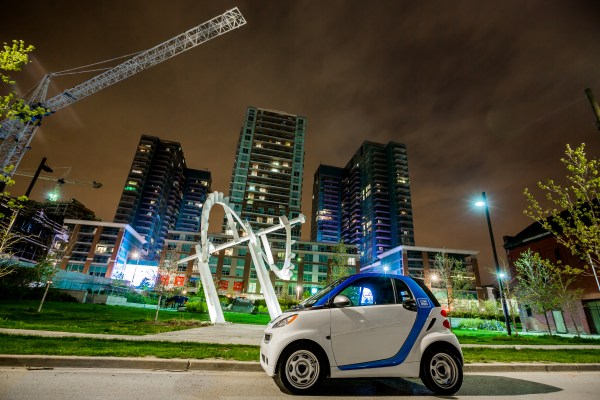Cars are one of the top contributors to greenhouse gas emissions globally, and cars in cities can be especially heavy with their contributions, owing to traffic and population density. And while encouraging everyone to bike or use public transit probably isn’t going to convince everyone to ditch car ownership, car sharing services seem to be winning more city denizens over, and a new study shows that the results of said services are good, both for the environment and for reducing unnecessary personal budget burdens.
The study (full PDF available here), conducted by research group Innovative Mobility Research (IMR) working out of the Transportation Sustainability Research Center at UC Berkeley, looked specifically at one-way car sharing in North America, with a focus on car2go since it has the largest reach and is present in a number of major urban markets. With one-way car sharing, members of the service can pick up a car at one spot and drop it at another — here in Toronto, for instance, car2go vehicles can be picked up on city streets, in city-run “Green P” parking lots and at the airport.
The IMR’s study focused on car2go members in Calgary, San Diego, Seattle, Vancouver and Washington, and relies on self-reported info derived from polling car2go users, combined with vehicle activity data provided by car2go for the purposes of the study.
What they found was that both vehicle ownership and emissions from driving dropped as a result of car sharing programs being present in these cities. Reduced emissions are a reflection of reduced driving overall, as car2go members seem not to use cars as much as car owners, despite using public transportation just as much or even less than before car sharing was introduced. In the vast majority of cases, however, respondents reported walking more.
In terms of ownership, the survey found that a small but non-trivial number of respondents either sold or didn’t bother to buy a personal vehicle as a result of having a one-way car sharing system in place. In total across all five cities, the study suggests that between four and nine owned vehicles were suppressed (i.e. sold or never purchased to begin with) per car sharing vehicle present in the city. That represents a huge shift in the total number of vehicles on the road, and the resulting cost from a manufacturing, ownership/usage and disposal perspective, if accurate.
Anecdotally, car2go has done well here in Toronto. In addition to expanding pick-up/drop-off points from just parking lots to any residential street, it has added four-door Mercedes vehicles to its fleet (in addition to the standard smart fortwos that make up the bulk of its offerings). I’ve heard from a fellow TechCrunch writer that, again anecdotally, car2go has also become pretty commonplace in Seattle.
Car sharing is still far from being the norm among city-dwellers when it comes to transportation options, but this study shows that even modest membership numbers could have big impact on the health of a city.
